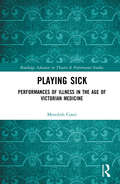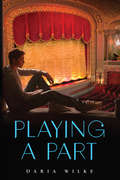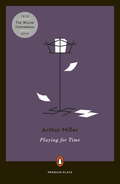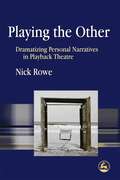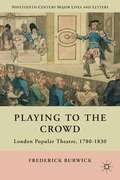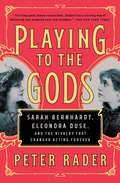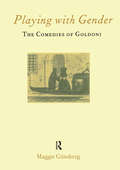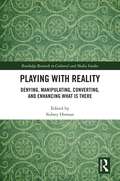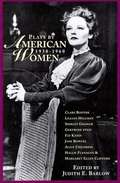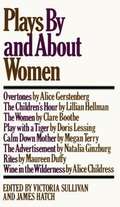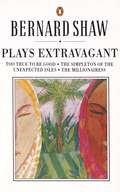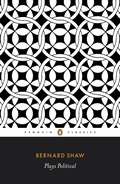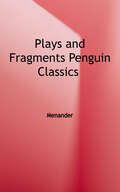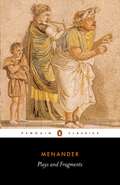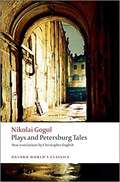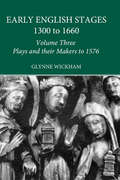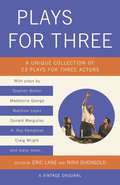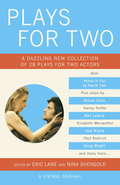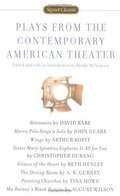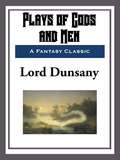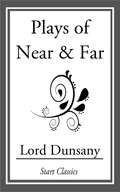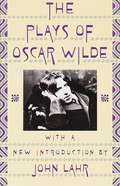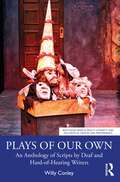- Table View
- List View
Playing Sick: Performances of Illness in the Age of Victorian Medicine (Routledge Advances in Theatre & Performance Studies)
by Meredith ContiFew life occurrences shaped individual and collective identities within Victorian-era society as critically as witnessing or suffering from illness. The prevalence of illness narratives within late nineteenth-century popular culture was made manifest on the period’s British and American stages, where theatrical embodiments of illness were indisputable staples of actors’ repertoires. Playing Sick: Performances of Illness in the Age of Victorian Medicine reconstructs how actors embodied three of the era’s most provocative illnesses: tuberculosis, drug addiction, and mental illness. In placing performances of illness within wider medicocultural contexts, Meredith Conti analyzes how such depictions confirmed or resisted salient constructions of diseases and the diseased. Conti’s case studies, which range from Eleonora Duse’s portrayal of the consumptive courtesan Marguerite Gautier to Henry Irving’s performance of senile dementia in King Lear, help to illuminate the interdependence of medical science and theatre in constructing nineteenth-century illness narratives. Through reconstructing these performances, Conti isolates from the period’s acting practices a lexicon of embodied illness: a flexible set of physical and vocal techniques that performers employed to theatricalize the sick body. In an age when medical science encouraged a gradual decentering of the patient from their own diagnosis and treatment, late nineteenth-century performances of illness symbolically restored the sick to positions of visibility and consequence.
Playing a Part
by Marian Schwartz Daria WilkeThe first young adult novel translated from Russian, a brave coming-out, coming-of-age story.In June 2013, the Russian government passed laws prohibiting "gay propaganda," threatening jail time and fines to offenders. That same month, in spite of these harsh laws, a Russian publisher released PLAYING A PART, a young adult novel with openly gay characters. It was a brave, bold act, and now this groundbreaking story has been translated for American readers.In PLAYING A PART, Grisha adores everything about the Moscow puppet theater where his parents work, and spends as much time there as he can. But life outside the theater is not so wonderful. The boys in Grisha's class bully him mercilessly, and his own grandfather says hateful things about how he's not "masculine" enough. Life goes from bad to worse when Grisha learns that Sam, his favorite actor and mentor, is moving: He's leaving the country to escape the extreme homophobia he faces in Russia. How Grisha overcomes these trials and writes himself a new role in his own story is heartfelt, courageous, and hopeful.
Playing a Part in History
by Margaret RogersonThe York Mystery Plays are a cycle of originally performed on wagons in the city. They date from the fourteenth century and Biblical narrative from Creation to Last Judgment. After nearly four hundred years without a performance, a revival of the York Mysteries began in 1951 when local amateurs led by professional theatre practitioners staged them during the festival of Britain. Playing a Part in History examines the ways in which the revival of these plays transformed them for twentieth- and twenty-first-century audiences. Considering such topics as the contemporary popularity of the plays, the agendas of the revivalists, and major production differences, Margaret Rogerson provides a fascinating comparison of medieval and modern English drama. Drawing extensively on archival material, and newspaper and academic reviews of the plays in recent years, Playing a Part in History is not only an illuminating account of early English drama, but also of the ways in which theatre allows people to interact with the past.
Playing for Time (Penguin Plays)
by Arthur MillerA searing drama of the Holocaust--and the remarkable, moving story of the Auschwitz Women's Orchestra Paris, 1942. Fania Fénelon, a popular Jewish nightclub singer, is arrested by the occupying Germans. <P><P>Sent to Auschwitz in a packed freight-car, shorn of her hair, tattooed with an identifying number, starved, and subjected to harsh labor, she loses all traces of her former self. But her life at the camp changes dramatically when she is drafted into the Women's Orchestra, a desperate little ensemble that marches the prisoners out to work and gives concerts for the German high brass. Led by Alma Rosé, a sternly ambitious German-Jewish conductor who knows that her job is a matter of life and death, Fania and her fellow musicians must confront the horror taking place around them while pushing themselves to create beauty in the midst of despair. <P> Based on Fania Fénelon's memoir of the same name, Arthur Miller's Playing for Time was first produced as a CBS television drama starring Vanessa Redgrave before being adapted for the stage.
Playing the Other: Dramatizing Personal Narratives in Playback Theatre
by Nick RoweThis book is an exploration and critique of 'playback theatre', a form of improvised theatre in which a company of performers spontaneously enact autobiographical stories told to them by members of the audience. With more than ten years' experience as an actor with Playback Theatre York, the author introduces the reader to the basics of playback theatre within a historical and theoretical context. The history and development of the form is traced, from its conception in the late 1970s to its subsequent growth worldwide, and its relationship to the psychodrama tradition from which it has evolved is discussed. Through an examination of playback performances from the perspectives of performers, `tellers' of their stories and the audience, the author critically explores the nature, implications and ethics of the performers' response to the teller's experience, how notions of the public and personal are constructed, and the risks involved in improvising a response to a member of the audience's story. Playing the Other will be essential reading for drama students, dramatherapists and all those interested in the history and use of the theatre.
Playing to the Crowd
by Frederick BurwickThe firststudy ofthe productions of the minor theatres, how theywere adapted toappealto the local patrons and the audienceswho worked and lived inthese communities. "
Playing to the Gods: Sarah Bernhardt, Eleonora Duse, and the Rivalry that Changed Acting Forever
by Peter RaderThe riveting story of the rivalry between the two most renowned actresses of the nineteenth century: legendary Sarah Bernhardt, whose eccentricity on and off the stage made her the original diva, and mystical Eleonora Duse, who broke all the rules to popularize the natural style of acting we celebrate today.Audiences across Europe and the Americas clamored to see the divine Sarah Bernhardt swoon—and she gave them their money’s worth. The world’s first superstar, she traveled with a chimpanzee named Darwin and a pet alligator that drank champagne, shamelessly supplementing her income by endorsing everything from aperitifs to beef bouillon, and spreading rumors that she slept in a coffin to better understand the macabre heroines she played. Eleonora Duse shied away from the spotlight. Born to a penniless family of itinerant troubadours, she disappeared into the characters she portrayed—channeling their spirits, she claimed. Her new, empathetic style of acting revolutionized the theater—and earned her the ire of Sarah Bernhardt in what would become the most tumultuous theatrical showdown of the nineteenth century. Bernhardt and Duse seduced each other’s lovers, stole one another’s favorite playwrights, and took to the world’s stages to outperform their rival in her most iconic roles. A scandalous, enormously entertaining history full of high drama and low blows, Playing to the Gods is the page-turning account of the feud that changed theater forever.
Playing with Gender: The Comedies of Goldoni
by Maggie Gunsberg"This work takes gender as its point of entry into the comedies of Carlo Goldoni (1707-93). The dramatization of femininity and masculinity is explored in conjunction with that of other social categories (class, the family, and age). The plays reinforce the patriarchal association of femininity with the body, with spectacle, and with theatricality, while the dramatic backdrop of Venice and carnival provides a context for the staging of issues relating to identity, disguise and fashion. In the plays, pretence and theatricality vie with bourgeois Enlightenment values of morality, honesty and respectability to produce dramatic tension with distinct gender implications."
Playing with Reality: Denying, Manipulating, Converting, and Enhancing What Is There (Routledge Research in Cultural and Media Studies)
by Sidney HomanThis volume explores how and why we deny, or manipulate, or convert, or enhance reality. Finding it important to come to terms with reality, with what is there before us, and, with reality however defined, to live responsibly, this collection takes a truly multidisciplinary approach to examining the idea that history, the truth, facts, and the events of the present time can be refashioned as prismatic, theatrical, something we can play with for agendas either noble or ignoble. An international team of contributors considers the issue of how and why, in dealing what is there before us, we play with reality by employing theatre, fiction, words, conspiracy theories, alternate realities, scenarios, and art itself. Chapters delve into issues of fake news, propaganda, virtual reality, theatre as real life, reality TV, and positive ways of refashioning and enhancing your own reality. Drawing on examples from film studies to sociology, from the social sciences to medicine, this volume will appeal to scholars and upper-level students in the areas of communication and media studies, comparative literature, film studies, economics, English, international affairs, journalism, philosophy, psychology, sociology, and theatre.
Plays By American Women, 1930-1960
by Judith E. BarlowIncludes: Clare Booth's The Women; Lillian Hellman's The Little Foxes; Shirley Graham's It's Morning; Gertrude Stein's The Mother of Us All; Fay Kanin's Goodbye, My Fancy; Jane Bowles' In the Summer House; Alice Childress' Trouble in Mind; Halle Flanagan and Margaret Ellen Clifford's Can You Hear Their Voices?
Plays By and About Women
by James Hatch Victoria SullivanEight plays, all written in this century, in which leading women dramatists present their own pictures of their sex.
Plays Extravagant: Too True to be Good, The Simpleton of the Unexpected Isles, The Millionairess
by George Bernard Shaw Dan LaurenceThis is a collection of the plays of George Bernard Shaw that includes "The Millionairess", "Too True to be Good" and "The Simpleton of the Unexpected Isles".
Plays Political: The Apple Cart, On the Rocks, Geneva
by George Bernard Shaw Dan LaurenceWhile some of Shaw’s earlier plays are still performed, his later plays, such as the ones in this volume, are barely known. As the collective title indicates, the themes here are political; yet, frankly, it is doubtful how seriously we can now take Shaw as a political thinker. Despite writing in the 1930s, he has little to say of the nature of totalitarianism: although he satirises Fascist dictators in “Geneva”, the satire is disappointingly mild. Neither did Shaw appear to foresee (on the evidence of these plays, at least) the imminent collapse of the British Empire.But it is Shaw the dramatist rather than Shaw the political philosopher who still holds our attention – even in plays as explicitly political as these. He had a sharp intellect and a quirky sense of humour, and his dialogue still glints and sparkles: he couldn’t write a dull line if he tried. No matter how serious the themes he addresses, the crispness of his writing and his lightness of touch still scintillate.Shaw seems, perhaps unfairly, out of fashion nowadays. But even in these lesser-known works, he demonstrates his matchless ability, still undimmed, to provoke and to entertain.
Plays and Fragments
by MenanderMenander (c. 341-291 BC) was the foremost innovator of Greek New Comedy, a dramatic style that moved away from the fantastical to focus upon the problems of ordinary Athenians. <p><p>This collection contains the full text of 'Old Cantankerous' (Dyskolos), the only surviving complete example of New Comedy, as well as fragments from works including "The Girl from Samos" and "The Rape of the Locks," all of which are concerned with domestic catastrophes, the hazards of love and the trials of family life. <p><p>Written in a poetic style regarded by the ancients as second only to Homer, these polished works—profoundly influential upon both Roman playwrights such as Plautus and Terence, and the wider Western tradition—may be regarded as the first true comedies of manners.
Plays and Fragments
by MenanderMenander (c. 341-291 BC) was the foremost innovator of Greek New Comedy, a dramatic style that moved away from the fantastical to focus upon the problems of ordinary Athenians. This collection contains the full text of 'Old Cantankerous' (Dyskolos), the only surviving complete example of New Comedy, as well as fragments from works including 'The Girl from Samos' and 'The Rape of the Locks', all of which are concerned with domestic catastrophes, the hazards of love and the trials of family life. Written in a poetic style regarded by the ancients as second only to Homer, these polished works - profoundly influential upon both Roman playwrights such as Plautus and Terence, and the wider Western tradition - may be regarded as the first true comedies of manners.
Plays and Petersburg Tales (Oxford World's Classics)
by Christopher English Nikolai Vasilevich Gogol Richard Arthur PeaceThis volume brings together Gogol's Petersburg Tales with his two most famous plays, all of which guide us through the streets of St. Petersburg, the city erected by force and ingenuity on the marshes of the Neva estuary. Something of the deception and violence of the city's creation seems to lurk beneath its harmonious facade, however, and it confounds its inhabitants with false dreams and absurd visions. This new translation by Christopher English brings out the unique vitality and humor of Russia's finest comic writer. <p><p> About the Series: For over 100 years Oxford World's Classics has made available the broadest spectrum of literature from around the globe. Each affordable volume reflects Oxford's commitment to scholarship, providing the most accurate text plus a wealth of other valuable features, including expert introductions by leading authorities, voluminous notes to clarify the text, up-to-date bibliographies for further study, and much more.
Plays and their Makers up to 1576
by Glynne WickhamThis volume forms part of the 5 volume set Early English Stages 1300-1660. This set examines the history of the development of dramatic spectacle and stage convention in England from the beginning of the fourteenth century to 1660.
Plays for Three
by Eric Lane Nina ShengoldPLAYS FOR THREE is a unique anthology of 23 outstanding plays for three actors by an exciting mix of established and emerging playwrights. Everyone's heard that "Two's company, three's a crowd." That may be true on a date, but on stage, three is a magic number. Add a third character to any interaction and the dramatic possibilities increase exponentially: suddenly there's competition, intrigue, shifting allegiances, comic misunderstandings, secrets and lies. Triangles make excellent drama, and three-handers offer the kind of substantial and challenging roles that actors love. Plays for Three offers six full-length and seventeen short plays featuring dramatic trios of every sort. Rob AckermanPete BarryStephen BelberCesi DavidsonAdrienne DawesPhilip DawkinsCatherine FillouxMadeleine GeorgeAmlin GrayFrank HigginsCory HinkleWendy KesselmanEric LaneKitt LavoieMark Harvey LevineMatthew LopezDonald MarguliesAnna MoenchA. Rey PamatmatDavid Riedy Nina ShengoldStephen WebbCraig WrightFrom the Trade Paperback edition.
Plays for Two
by Eric Lane Nina ShengoldPlays for Two is a unique anthology of twenty-eight terrific plays for two actors, by a mix of celebrated playwrights and cutting-edge new voices.It takes two to tango--or to perform a duet, fight a duel, or play ping-pong. The two-character play is dramatic confrontation stripped to its essence. These four full-length and twenty-four short plays feature pairs of every sort--strangers, rivals, parents and children, siblings, co-workers, friends, and lovers--swooning or sparring, meeting cute or parting ways. In a dizzying range of moods and styles, these two-handers offer the kind of meaty, challenging roles actors love, while providing readers and audiences with the pleasures of watching the complex give-and-take dynamics of two keenly matched characters.Plays by: Billy Aronson, David Auburn, Pete Barry, Naveen Bahar Choudhury, Anthony Clarvoe, Steven Dietz, Halley Feiffer, Simon Fill, Frank Higgins, David Ives, Jacob Juntunen, Ean Miles Kessler, Neil LaBute, Eric Lane, Kitt Lavoie, Jacqueline E. Lawton, Mark Harvey Levine, Elizabeth Meriwether, Michael Mitnick, Daria Polatin, Marco Ramirez, Kelly Rhodes, Jose Rivera, Paul Rudnick, Edwin Sanchez, Nina Shengold, Cori Thomas, Doug Wright From the Trade Paperback edition.
Plays from the Contemporary American Theater
by Brooks McnamaraIncludes eight full-length, award-winning plays: Streamers by David Rabe Marco Polo Sings a Solo by John Guare Wings by Arthur Kopit Sister Mary Ignatius Explains It All for You by Christopher Durang Crimes of the Heart by Beth Henley The Dining Room by A. R. Gurney Painting Churches by Tina Howe Ma Rainey's Black Bottom by August Wilson
Plays of Gods and Men
by Lord DunsanyEdward John Moreton Drax Plunkett, 18th Baron of Dunsany was an Anglo-Irish writer and dramatist, notable for his work in fantasy published under the name Lord Dunsany. More than eighty books of his work were published, and his oeuvre includes hundreds of short stories, as well as successful plays, novels and essays. Born to one of the oldest titles in the Irish peerage, he lived much of his life at perhaps Ireland's longest-inhabited home, Dunsany Castle near Tara, received an honourary doctorate from Trinity College, and died in Dublin.
Plays of Near & Far
by Lord DunsanyEdward John Moreton Drax Plunkett, 18th Baron of Dunsany was an Anglo-Irish writer and dramatist, notable for his work in fantasy published under the name Lord Dunsany. More than eighty books of his work were published, and his oeuvre includes hundreds of short stories, as well as successful plays, novels and essays. Born to one of the oldest titles in the Irish peerage, he lived much of his life at perhaps Ireland's longest-inhabited home, Dunsany Castle near Tara, received an honourary doctorate from Trinity College, and died in Dublin.
Plays of Oscar Wilde (Vintage Classics)
by Oscar WildeThis Vintage edition of The Plays_of Oscar Wilde contains the plays that made Wilde one of the most important dramatists of his time, including The Importance of Being Earnest, one of the great works of modern literature.Oscar Wilde's plays demonstrate once again why their author must be seen as both an inaugurator and a master of modernism. In his best work, the subversive insights embedded in his wit continue to challenge our common assumptions. Wilde's ability to unsettle and startle us anew with his radical vision of the artifice inherent in the self's construction makes him our contemporary.This edition is introduced by John Lahr, author of Prick Up Your Ears: The Biography of Joe Orton. The plays included are Lady Windermere's Fan, Salome, A Woman of No Importance, An Ideal Husband, and The Importance of Being Earnest.From the Trade Paperback edition.
Plays of Our Own: An Anthology of Scripts by Deaf and Hard-of-Hearing Writers (Routledge Series in Equity, Diversity, and Inclusion in Theatre and Performance)
by Willy ConleyPlays of Our Own is the first anthology of its kind containing an eclectic range of plays by Deaf and hard-of-hearing writers. These writers have made major, positive contributions to world drama or Deaf theatre arts. Their topics range from those completely unrelated to deafness to those with strong Deaf-related themes such as a dreamy, headstrong girl surviving a male-dominated world in Depression-era Ireland; a famous Spanish artist losing his hearing while creating his most controversial art; a Deaf African-American woman dealing with AIDS in her family; and a Deaf peddler ridiculed and rejected by his own kind for selling ABC fingerspelling cards. The plays are varied in style – a Kabuki western, an ensemble-created variety show, a visual-gestural play with no spoken nor signed language, a cartoon tragicomedy, historical and domestic dramas, and a situation comedy. This volume contains the well-known Deaf theatre classics, My Third Eye and A Play of Our Own. At long last, directors, producers, Deaf and hearing students, professors, and researchers will be able to pick up a book of "Deaf plays" for production consideration, Deaf culture or multicultural analysis, or the simple pleasure of reading.
